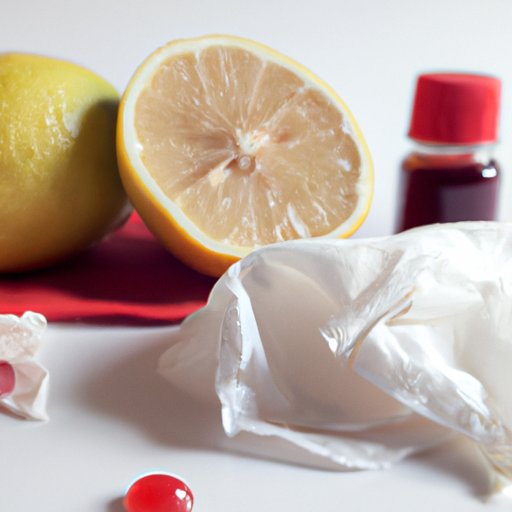
Introduction
The common cold is a highly contagious viral infection that affects millions of people every year. It’s characterized by a range of symptoms, including runny nose, sore throat, cough, congestion, and fatigue. While most people recover from a cold within a few days to a week, the symptoms can be uncomfortable, and in some cases, potentially dangerous for more vulnerable populations. In this article, we’ll provide you with some tips and tricks to help you get over a cold quickly and easily.
Rest and Hydration
One of the most important things you can do to help your body fight off a cold is to get enough rest and stay hydrated. When you’re sick, your body needs plenty of fluids to help flush out the virus and alleviate symptoms like congestion and coughing. Aim to drink at least eight glasses of water a day, and consider incorporating other fluids like herbal tea, broth, or sports drinks. Additionally, make sure to get plenty of rest, and avoid strenuous exercise or activities that might worsen your symptoms. Giving your body time to recharge its batteries will help speed up the healing process.
Steam Therapy
Steam therapy is a great way to relieve congestion and coughing caused by a cold. When you inhale steam, it can help to loosen the mucus in your nasal passages and lungs, making it easier to breathe. There are several ways to incorporate steam therapy into your daily routine, from taking a hot shower to using a humidifier or vaporizer. You can also try placing a hot, damp towel over your face and inhaling the steam.
Over-the-Counter Medication
If you’re experiencing discomfort from your cold symptoms, over-the-counter medication is an effective way to alleviate them. There are several types of medication available, including pain relievers, decongestants, and cough medicines. Pain relievers like acetaminophen or ibuprofen can help relieve headaches, body aches, and fever. Decongestants can help alleviate stuffy noses and sinuses. Be sure to talk to your healthcare provider before using any medication, especially if you have underlying health conditions or are taking other drugs
Vitamin C
There’s a reason why people often reach for a glass of orange juice when they’re feeling under the weather – vitamin C can help boost the immune system and fight off colds. Incorporating vitamin C-rich foods like oranges, strawberries, bell peppers, and leafy greens into your diet can help provide your body with the nutrients it needs to heal quickly. You can also try taking dietary supplements that are high in vitamin C, like Emergen-C or airborne.
Gargling
If you’re experiencing a sore throat, gargling with salt water can help soothe it and reduce inflammation. Simply dissolve half a teaspoon of salt in a cup of warm water, and gargle for a few seconds before spitting it out. Repeat several times a day as needed.
Honey and Lemon
Honey and lemon are both natural remedies that can help alleviate coughing and sore throat symptoms. Honey is a natural cough suppressant, and lemon is high in vitamin C, making it a great immune booster. You can mix one tablespoon of honey with some lemon juice in a cup of warm water and drink it slowly. Alternatively, you can simply eat a spoonful of honey, or mix it into tea.
Avoiding Contact with Others
Finally, one of the most important things you can do when you have a cold is to avoid contact with others. Colds can be highly contagious, and spreading your infection to others can be dangerous, especially for more vulnerable populations like the elderly, young children, or those with compromised immune systems. Stay home from work or school, and avoid close contact with others until you’re fully recovered.
Conclusion
While having a cold can be uncomfortable, following these tips and tricks can help you get over it quickly and easily. Remember to rest and stay hydrated, incorporate steam therapy into your daily routine, consider using over-the-counter medication if needed, and boost your immune system with vitamin C-rich foods and honey and lemon. Most importantly, be sure to avoid contact with others while you’re sick to prevent the spread of your infection.




